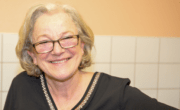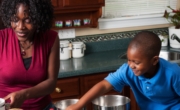The time surrounding a diagnosis of Autism can be challenging for families and bring up all sorts of emotions for everyone involved. Here, Lucy takes us through what her son’s diagnosis meant for her family.
Our son was diagnosed with high-functioning Autism in 2021 just before his 15th birthday.
We felt so many emotions. On one hand, there was some shock and grief, but in other ways, this really felt like the last piece of the jigsaw! We had already had diagnoses of dyspraxia, dyslexia, and dyscalculia before, but they had never quite explained it all.
“I felt empowered to be a much more useful and effective advocate for my son.”
Suddenly we understood why our family life tended to involve so much structure and routine and was laden with compromise – finally, it felt like we could stop questioning ‘what is it that we keep getting so wrong?’
This opened the door to a new world of research and information.
With Autistic Spectrum Disorder covering such a broad spectrum it was demoralising knowing where to start; what was relevant to us? what did high functioning really mean? What strategies should we try to help with his fixed interests, his intolerance for transitions and the seemingly out-of-the-blue over reactions that came after being asked to clean his teeth, get ready for school or even do something fun.!
Living with an Autism diagnosis is challenging and immensely stressful at times and it can be worrying and even terrifying to look ahead to the future. It can also be incredibly isolating for both you and your child.
With a relatively late diagnosis, I really can’t imagine how our son felt (and possibly still feels) when he wasn’t fully understood at home or at school. As a parent, I feel both helpless and heartbroken but also proud of how resourceful, resilient, and persistent he has become. It’s tough for him to have to spend every day masking the true difficulties he faces.
“There needs to be a lot more emphasis on what a child can do, instead of what he cannot do.”
These difficulties can include deciphering social interactions in noisy environments,; understanding what was being inferred in English texts and working out where to start with a list of instructions on how to make scones in Food Tech before he had even managed to wash his hands and put on an apron.
Sadly, he’s also quietly accepted punishment for not completing homework that he didn’t understand or had forgotten had been set. Is it really any wonder that at the end of the day he feels physically, mentally, and emotionally drained and just wants to immerse himself in front of a screen and not take part in some equally challenging after-school activity or tidy his room.
The Family Action Puffins course was a lifeline, just at the point when we needed it most.
“The Family Action Puffins course was a lifeline, just at the point when we needed it most.”
Anxiety levels about GCSE’s and what to do next were reaching fever pitch, with the deadlines for applying for further education imminent. The information Family Action provided explained the ASD spectrum in full technicolour in a tangible and relevant way and highlighted many sensory issues that instantly explained so much.
The Family Action Puffins course tutors’ personal experiences helped enormously with both understanding and empathy and literally no question was left unanswered. At last, I had real strategies and ideas – often tried and tested – that we could attempt at home.
We were also signposted to other useful organisations and agencies and I felt empowered to be a much more useful and effective advocate for my son. Last, but not least, I had finally met another mum, who was experiencing very similar teenage parenting dilemmas and so I could be totally honest with her!
Of course, we still face major roadblocks at times, but on balance,; since the Family Action course, family life is much more harmonious.
The greatest thing I learnt? To celebrate the uniqueness of my child:; his creativity, honesty, kindness and determination. It’s something we could all stand to learn. To quote the American Autism commentator Temple Grandin, “There needs to be a lot more emphasis on what a child can do, instead of what he cannot do.”
Read more inspiring stories from the families we support and find out the difference we make.







